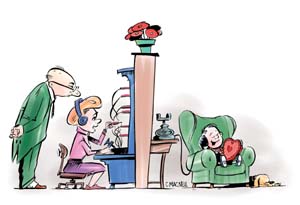 |
 |
| current issue |  |
past issues |  |
send a letter/news |  |
address update |  |
advertise |  |
about us |  |
alumni home |
Campus Currents
Dial "O" for Obligingby David Brooks
B
y its nature, oral history is more spontaneous than the written kind. But when UNH historian Judith Moyer '68, '71G, '00G holds public talks about telephone operators in New Hampshire, the history gets so spontaneous it could almost be described as off-the-cuff.
"It usually starts out as a lecture but soon becomes a mutual story-weaving, which is great fun, and turns out to be good history," says Moyer, a research assistant professor. "It's oral history on the spot."
Moyer got interested in operators as an extension of her specialty, the history of women's labor. The research began as the statewide "Number Please" project, funded by the New Hampshire Humanities Council. Volunteers in local communities interviewed former operators and transcribed their stories. Moyer found the subject, a nexus of technology, sociology and small-town life, so fascinating that she is turning it into a book.

|
One of the questions she finds interesting is why an occupation on the cutting edge of technology, like telephone operators in the late 1800s and early 1900s, was quickly dominated by women. Certainly, women could be paid less than men, had few other job options and were more "amenable to discipline," to use a phrase of the time. One of the reasons may have been technical. "It was said that women's voices were better on the early telephones that had poor quality sound, because higher-pitched voices carried better," Moyer says.
Perhaps more important, though, is the role that operators played, particularly in small places like New Hampshire towns. Over time, operators evolved into "an answering service, an emergency alarm service, a 911," she says. It could even be a secretarial service: You never had to tell anybody you were gone for the day because the operators knew and would tell your callers, Moyer notes.
"The operators themselves felt very responsible, felt this truly was a worthy service and occupation," she adds.
A worthy topic for a historian, too, as Moyer is reminded every time she talks about it. "It's academic history, and it's fun."
Easy to print version
blog comments powered by Disqus
Current issue | Past issues | Current class notes | Class notes archives
Department archives | Send a letter/news | Address updates
Advertise | About UNH Magazine | Alumni home | UNH home
University of New Hampshire Alumni Association
9 Edgewood Road Durham NH 03824 (603) 862-2040
alumni@unh.edu

